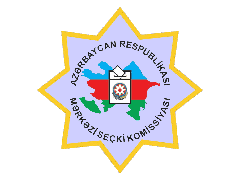NEWS
-
16.04.2021
Baku has hosted a closed award ceremony for the winners of the Miss & Mister Azerbaijan 2020 beauty contest.
The project's chief coordinator, choreographer Ayla Mais told that last year the beauty contest was held virtually amid coronavirus pandemic. So, the winners could not receive their awards. The awarding of the remaining 2020 winners is planned at subsequent events.
This year the final night was held in compliance with the quarantine rules.
The winners include Banu Shujai (Miss Azerbaijan) and Elchin Dadashov (Mister Azerbaijan).
The organizer and founder of the Miss & Mister Azerbaijan 2020 contest is publicist Anela Ordukhanova. Miss & Mister Azerbaijan has been held annually since 1996.
-
16.04.2021
Members of the Shusha State Musical Theater have been awarded with honorable certificates.
The theater workers, including Honored Artists Nazir Rustamov, Teymur Mammadov, actresses Bahar Gamzayeva, Pustakhanim Zeynalova, chief artist Valeh Mammadov were among the recipients.
Presenting certificates of honor to the actors, the chairman of Azerbaijan Theater Workers Union, People's Artist Azer Pasha Nematov spoke about the history of the Shusha State Musical Theater and stressed its significance for national culture.
He praised the Shusha State Musical Theater for its contribution to the Azerbaijani theater art.
In their remarks, the director of the Shusha State Musical Theater, Honored Artist Yadigar Muradov and the recipients expressed gratitude to the Azerbaijan Theater Workers Union, for the high appraisal of their work.
Shusha Musical Drama Theater has been operating since 1938. In 1992, the theater moved to Baku due to the Nagorno-Karabakh war.
In 2018, Shusha State Musical Drama Theater opened its doors after the major reconstruction.
The reconstruction works were commissioned by the State Service for the Protection, Development and Restoration of Cultural Heritage under the Ministry of Culture.
On the second floor there are rooms for sound and light operators, a film projection room. The stage was reconstructed as well. The building was provided with new telecommunication systems.
The theater successfully stages works of such prominent figures as Fatali Akhundov, Abdurrahim bey Hagverdiyev, Jafar Jabbarly, Samad Vurgun, etc.
-
President of the International Turkic Culture and Heritage Foundation Gunay Afandiyeva has met with Lithuanian Ambassador to Azerbaijan Egidijus Navikas.
During the meeting, Gunay Afandiyeva spoke about the projects implemented in the framework of preserving and promoting the culture and heritage of the Turkic-speaking peoples in the international arena, as well as about conferences and seminars held at the present time in accordance with the conditions of the ongoing COVID-19 pandemic. Gunay Afandiyeva noted the importance of the Memorandum signed in February this year between the Foundation and the Lithuanian Embassy in Azerbaijan aimed at protecting the history and culture of Lithuanian minorities of Turkic ethnic origin - Tatars and Karaites.
Ambassador Egidijus Navikas highly appreciated the activities of the Foundation and said that he would support the work and projects carried out by the organization in this direction. Praising the signing of the Memorandum between the Foundation and the country, the ambassador emphasized the existing mutual cultural ties between Lithuania and the member and observer countries of the organization. Egidijus Navikas also noted that Lithuania pays special attention to the protection and study of the historical and cultural heritage of the minorities Turkic-speaking peoples living in the country.
The ambassador also expressed confidence that cooperation between the Foundation and the Embassy would continue to develop successfully.
Issues of expanding and strengthening ties between the parties were discussed at the meeting.
-
President of the International Turkic Culture and Heritage Foundation Gunay Afandiyeva has met with Minister of Culture, Information, Sports and Youth Policy of Kyrgyzstan Kairat Imanaliev.
The sides discussed the development and expansion of relations between the Foundation and Kyrgyzstan.
Gunay Afandiyeva stressed the importance of the meeting, and spoke about the prospects for further cooperation between the Foundation and Kyrgyzstan.
Minister Kairat Imanaliyev, highly appreciating the activities of the Foundation, noted that he will support the ongoing work and projects of the organization.
-
National History Museum has displayed memorable exhibits dedicated to one of the first Azerbaijani theater and film actors, People's Artist of Azerbaijan Ruhulla Axundov (1886-1959).
This year marks the 135th anniversary of the birth of the great actor, who played more than 300 roles.
In 1964, the museum's collection has been enriched with new exhibits donated by the actor's family.
Among the exhibits is a crown that the actor wore while playing the main role in the play "Agha Mohammad Shah Qajar" (1916).
There are also two seals in the museum, which bear inscriptions in Russian and Arabic.
In addition, the museum contains a photograph of the actor, taken in 1930, and the book "Sidgi Rukhulla" by Muhammad Jafar Jafarov, published in 1956.
Ruhulla Axundov was born in the suburb of Baku. His father, Molla Fatullah, was not only a religious figure, but also a talented poet. The poet was considered a follower of the Azerbaijani classics Fuzuli and Nasimi, instilling in children a love of poetry and science.
Having lost his father at the age of 18, Ruhulla Axundov sold his handwritten poems to receive an education in Moscow. However, funds were insufficient and he returned home.
Having played the role of Sidgi in the drama "Homeland", the actor took the name of this character as a pseudonym.
He also played a female role (Telli) in Najaf bay Vezirov's play since women did not perform on the stage in the past. He learned acting from Jahangir Zeynalov, the founder of realism in Azerbaijan.
He toured to many countries including Georgia, Turkmenistan, Uzbekistan, Russia, Ukraine, Iran, etc, where he also staged performances as a director.
From 1924 until the end of his life, he was the leading actor of the Azerbaijan Theater named after Azizbeyov (now the State Academic National Drama Theater).
-
15.04.2021
Director of the Heydar Aliyev Palace Ramil Gasimov and ballet master in chief of the Primorsky Stage of the Mariinsky Theater Eldar Aliyev have discussed prospects of cultural cooperation.
During the meeting, Ramil Gasimov stressed the importance of developing and further strengthening ties between the Heydar Aliyev Palace and the Primorsky Stage of the Mariinsky Theater.
Ramil Gasimov also invited the Primorsky Stage of the Mariinsky Theater on a tour to Azerbaijan.
Ballet master Eldar Aliyev expressed gratitude for the acquaintance and shared his memories about the Heydar Aliyev Palace.
The meeting continued with a discussion of details on the development of bilateral relations.
Notably, Heydar Aliyev Palace has recently agreed on further partnership with the Bolshoi Theater, International Mugham Center and Bilkent Symphony Orchestra.
A number of joint projects will be implemented as part of the cooperation in future.
Heydar Aliyev Palace is a major venue in Baku, seating 2,500 people. The palace was renamed after the death of Azerbaijani President Heydar Aliyev in 2003.
The opening of the building took place on December 14, 1972. The Heydar Aliyev Palace was reconstructed in 2007-2008.
The official opening of the reconstructed palace took place on November 5-6, 2008.
This year, Heydar Aliyev Palace marks its 50th anniversary. As part of the celebration, Heydar Aliyev Palace launched a new project titled "Historical Stage".
The project headed by the Heydar Aliyev Palace director Ramil Gasimov brought together People's Artists Alim Gasimov, Siyavush Kerimi, Yalchin Adigozalov, Honored Artists Tahir Imanov and Jabir Imanov.
The project will be completed by the end of 2022 with spectacular festival.
The Heydar Aliyev Palace has recently opened a producer centre at the initiative of Heydar Aliyev Palace Director Ramil Gasimov.
The centre aims to discover young talents (16-22 years old) in the following areas of art: jazz, pop, classic vocals, instrumental performances and painting.
The producer centre, which is to operate with the Culture Ministry support, will provide the preparation of repertoires, voice recordings, vocal classes, stage movements, fitness service, image and stylistics, clip shootings, local and international events, festivals and sound competitions.
World-famous dancer and choreographer Eldar Aliyev has been awarded the honorary title "Honored Art Worker of the Russian Federation".
The chief choreographer of the Primorsky Stage of the Mariinsky Theatre, Eldar Aliyev, was born in Baku where he graduated from the Baku College of Choreography. From 1979–1992 he was a leading soloist of the Kirov (Mariinsky) Theatre. His repertoire includes leading roles in "Don Quixote", "The Legend of Love", "Le Corsaire", "Swan Lake", "La Bayadère", "Spartacus", and etc.
His partners on the stage included outstanding ballerinas: Galina Mezentseva, Gabriela Komleva, Tatiana Terekhova, Sylvie Guillem, Amanda Mckerrow, Leslie Browne, Altynai Asylmuratova.
He also worked in the USA as a leading soloist of the ballet company of Ballet Internationale (Indianapolis Ballet Theater), and soon became artistic director of the company.
Since 2015, he has been the Ballet Master in Chief of the Primorsky Opera and Ballet Theatre.
The choreographer has recently presented a new version of Fikrat Amirov's ballet "One Thousand and One Nights".
More than 300 costumes with hand embroidery were made for the ballet show. The magnificent performance of the ballet dancers left no one indifferent.
-
15.04.2021
"The Steppe Man" (Cholchu) has been screened in Moscow as part of "Evening" media project.
The main goal of the project is to promote cinematography of Asia and Africa.The film community is aimed not at high-grossing films, but at low-budget and independent cinema.
The project organizers are planning to hold monthly screenings and film discussions.
The film "The Steppe Man" was screened at the Nekrasov Central Universal Scientific Library. The feature film aroused great interest among viewers.
Directed by Shamil Aliyev, "The Steppe Man" tells a story of a young steppe man who lives in remoteness from the city, closely tied to nature. His father teaches him the subtleties of life in the steppe.
Soon after his father's death, the young man meets a girl from a city. Their meeting becomes a new page in his life, a step to a big life unfamiliar to him before.
The film was produced in 2012 at the Azerbaijanfilm studio by the order of the Culture and Tourism Ministry.
"The Steppe Man" has been screened at over 60 international film festivals, including the Florence Film Awards 2019 (Italy), the European Screen Awards 2019 (Indonesia), the White Unicorn International Film Festival 2019 (WUIFF) and others.
The film also won such nominations as "Best Director", "Best Screenplay", "Best Female Actor" and "Creative Search".
"The Steppe Man" was selected as the Azerbaijani entry for the "Best Foreign Language Film" at the 86th Academy Awards (the Oscars).
The film was named best at the Gralha International Monthy Film Awards 2020.
It won prizes in the categories "Best Feature Film" (Shamil Aliyev), "Best Director" (Shamil Aliyev), "Best Cinematography" (Rafig Guliyev) ,"Best Artist " (Rafig Nasirov) and "Best Costume Designer" (Aygun Aliyeva).
The scriptwriter of the film is Vidadi Hasanov, cinematographer - Rafig Guliyev, art directors - Rafig Nasirov and Ibrahim Halil Aminov, composer - Rauf Aliyev, producers - Mushvig Hatamov and Azer Guliyev.
-
15.04.2021
People's Artist of Azerbaijan Yusif Eyvazov will perform at the Bolshoi Theater of Russia.
The opera singer has been invited to play the role of Don Carlos in Giuseppe Verdi's opera of the same name. His performances are scheduled for April 15, 17 and 18.
Meanwhile, the opera "Don Carlos" will be presented at the Bolshoi Theater Historic stage on April 14-18.
People's Artist of Russia, opera diva Anna Netrebko will also take part in the opera.
The series of shows will be marked by a number of interesting debuts. Spanish opera singer Plácido Domingo will perform for the first time at the Bolshoi Theater as Rodrigo.
"Don Carlos" is a historical tragedy in five acts by Friedrich Schiller, written between 1783 and 1787.
The title character is Carlos, Prince of Asturias and the play as a whole is loosely modeled on historical events in the 16th century under the reign of King Philip II of Spain.
Known for his beautiful voice, Yusif Eyvazov is a regular guest at the world’s leading opera houses. His name is included in the book "The Best Tenors of the World".
The unique sound of his voice and his vibrant stage presence allow him to combine an active opera career with numerous concert performances.
The opera singer has appeared on numerous recordings for Deutsche Grammophon including a complete recording of Puccini’s "Manon Lescaut" live from the Salzburg Festival and with his spouse, soprano Anna Netrebko’s on the cross-over album "Romanza". In 2017, Yusif Eyvazov was awarded the title of People’s Artist of Azerbaijan.
-
13.04.2021
Azerbaijan Youth Union and the Union of Culture and Arts are pleased to announce International Arts Olimpia-2021 Contest.
The main goals of the contest include the development of creative skills in young people, promotion of culture and art and straitening friendly ties between nations.
Arts Olimpia is being held for the seventh time. The art contest will be held virtually amid coronavirus pandemic.
The competition is held in solo and duet nominations: music (keyboards, winds and drums), vocals, visual arts, theater and art reading, dance, design and modeling. All areas of art are represented in folk, modern and classical (academic) genres.
Speaking about the contest, the chairman of the Azerbaijan Union of Culture and Art Aziz Azizov stressed that the contest organizers always support young people and focuses on creating necessary conditions to show their talents in various art fields.
The contest is open for young talents in the following age categories: up to 7 years old, 7-8, 9-10, 11-12, 13-15 years old, from 16 years older.
Applications are accepted until April 30. The contest participants will be evaluated by the jury members until May 10.
-
The Georgian State Museum of Georgian Folk Music and Musical Instruments has exhibited Azerbaijanis traditional music instruments. There is a special corner at the museum dedicated to the country's national music.
Speaking about the exhibits, the museum director Revaz Kotrikadze stressed that the Georgian people are showing great interest in Azerbaijani culture.
The country's traditional music instruments are much loved worldwide. There are many other local history museums in Georgia that store traditional musical instruments, household items, as well as other exhibits reflecting Azerbaijan's rich culture and history.
Saz is a stringed musical instrument of the lute type. The instrument has a pear-shaped body, a neck with tied sliding frets, a wooden soundboard and double or triple strings.
Kamancha is a bowed string instrument, which is widespread among Eastern and Central Asian peoples under a variety of names.
The art of crafting and playing with kamancha, a bowed string musical instrument, was included into the UNESCO Representative List of the Intangible Cultural Heritage of Humanity.
Tar or a long-necked plucked lute is traditionally crafted and performed throughout Azerbaijan
It is made from mulberry, walnut and pear trees, and the face of the instrument is made from cattle heart membrane. Its strings differ by thickness and composition.
The music and craftsmanship of Azerbaijani musical instrument, tar, was inscribed in the UNESCO list in 2012.
Balaban is a cylindrical-bore, double-reed wind instrument with seven finger holes and one thumb hole. When you play the balaban you should use fingers of both hands to open and close certain holes. It can be made of mulberry or other harder woods, such as walnut.
The silver ring, which is more than 2,000 years old, has been discovered during archaeological excavations in Bargoed village of Ujar region.
Ring with the bluestone imprinted the image of balaban. The word "balaban" combines two Azerbaijani-Turkish words "bal" and "ban".
"Bala" means small or fragile and “ban” is an archaism that means "voice".
The name of the first performer on this instrument in Azerbaijan is unknown. However, the oldest chang performer was poetess Mahsati Ganjavi. In his works, Nizami also notes the name of Nagisa, master harpist and composer of the royal court of King Khosrau II of Persia.
This musical instrument is one of the most beloved of the Azerbaijani people.
The balaban is included in the orchestras and folk instruments ensembles. The sounding of the balaban is clearly reflected in such music pieces as "Second Fantasy" (Uzeir Hajibayli), "Dance Suite" (Muslim Magomayev), "In Dreams" (Khalil Jafarov), etc.
Oud is a pear-shaped stringed instrument with 11 or 13 strings grouped in 5 or 6 courses. Four strings of the musical instrument were likened to the four elements of nature: fire, water, earth, air. It was often depicted in the works of miniature painting.



.png?v=DqKtbngFu8-eBM77oNP77E2SV2gNF4_tUk0Y9IcK12s)

















